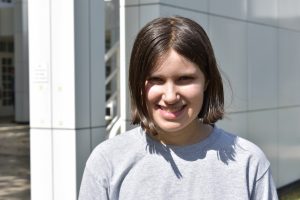Our 2017-18 class of International Peacemaking Program fellows includes nine students, four from the U.S. and five from other countries. We asked each one of them the same set of questions.
Q. Briefly tell us about your educational background.
A. In May, I completed my B.A. in religion with a criminology minor from Meredith College.
Q. How did you learn about Hartford Seminary’s International Peacemaking Program?
A. I applied and was accepted to Hartford Seminary for the Master of Arts in Religious Studies. I knew about the IPP through communication with the Seminary and alums, but it was the Seminary that reached out and offered me a place in this program. I was excited for the opportunity to complement my Master’s studies during my first year.
Q. Why are you interested in learning about peacemaking?
A. Peace has long been an important tenet of the Christian tradition. In recent months, I’ve become more aware of the theology of peace embraced by specific Christian thinkers, and that has prompted me to explore how I could incorporate that necessary ideal in my future work. Tensions are heightened, animosity is rampant, and unfortunately violence is still a sad reality. I want to learn constructive methods of addressing our pressing problems, and develop a solid, practical theology of peacemaking.
Q. How do you hope to use your skills after a year of training as a peacemaker?
A. I am hoping to work in community efforts that break down barriers and increase cooperation and compromise. I would like to give others the tools to continue peacemaking efforts and empower them to become peacemakers themselves. I am waiting to see where God might call me to be.
Q. Tell us a little about your home country and the interreligious conflict it faces.
A. While the greatest strength of the United States is diversity, we can’t deny that racism, sexism, homophobia, Islamophobia, and anti-Semitism are alive. We are drowning in our fear and paranoia, which is impeding our growth. I am especially bothered by the recent trends of insularity and walling ourselves off from the world. Global cooperation is imperative for the world to continue flourishing.
Q. Give us a quick description of your home life (family, where you live, etc.)
A. I was born and raised around Raleigh, North Carolina, and continued there for my undergraduate degree. My parents still live there and my older sister lives nearby. I’m incredibly blessed to have parents who have supported me every step of the way. I grew up in the Presbyterian Church USA, and I am hoping to make an eventual transition into the Quaker path.
Q. Hartford Seminary is using the phrase “We Were Built for This Time” to address the deep divisions in our country and across the world. What does that mean to you?
A. In my sociology classes in college, we learned about the concept of the “beloved community.” To me, the beloved community is a microcosm of God’s vision for the world: a group of people from all backgrounds, faiths, and ways of life, learning how to navigate life together. I believe that at Hartford Seminary, we are seeking to fulfill this vision, especially as we see our faiths lived out in everyday life. God’s people have always been builders, and as we build the beloved community here, we take pieces from here to build that foundation elsewhere and watch it thrive.

 Sign-up now ›
Sign-up now ›